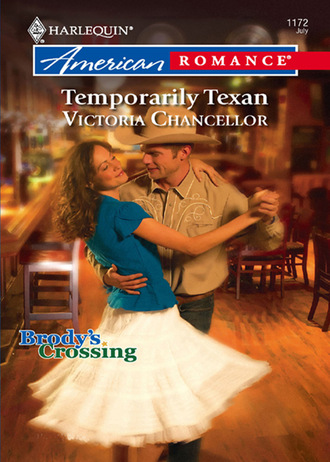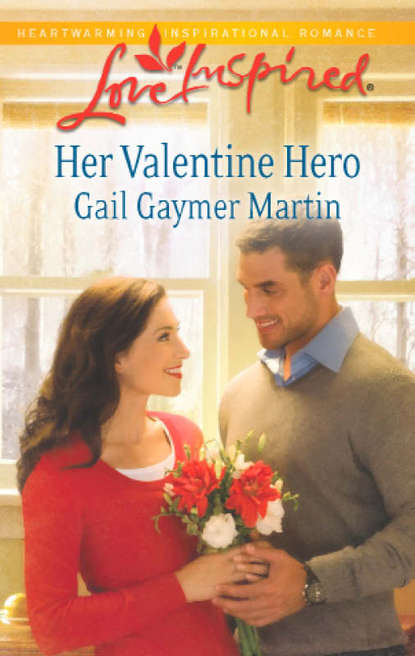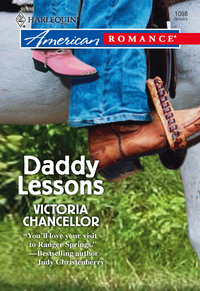
Полная версия
Temporarily Texan
He’d tried to call his association again, but with no luck other than the vague promise that they’d get back to him ASAP. The Internet hadn’t yielded any results for them, either. There was no apparent connection between the two groups.
Raven leaned against the kitchen counter near the sink. “I can’t believe Mrs. Philpot is the only person who can sort this out for me. This is just too bizarre.”
He opened the refrigerator and took out a beer. “Tell me about it. Every day without the guy I was expecting is another day wasted.” He held up the brown bottle for her to see. “Care to join me?”
“No. I’m too upset.”
He took a long drink from the bottle. She watched his throat move as he swallowed the cold beer. Odd, but she’d never thought swallowing beer could be so…sensual. He lowered the bottle and asked, “What kind of arrangement do you have with the gardening folks?”
“I’m helping a local organization get a historic farm certified by the state. The property and house were donated to the township but had to be renovated. The construction is just about complete, and we’re ready to plant the garden.”
“But why are you here?”
“The township felt it was better to have someone experienced to plant the garden rather than getting the locals to do it. So I volunteered to come down here for at least two weeks and work in the garden while, in return, the Society for the Preservation of Heritage Gardens will restore a homestead garden near where I live in New Hampshire. It’s rather like Habitat for Humanity, where people work in each other’s homes and eventually get their own house.”
“So you and your colleagues trade out time to help each other?”
“That’s right. We’re not paid. We’re all volunteers.”
“That must be tough—to take time away from your own jobs for two weeks.”
“Some people do it on their vacations, but in my case, I have a good friend, Della, who is taking care of my farm. She has an apartment in the city, but we work together on a lot of fiber projects, so she’s often at my place.”
He finished the beer and tossed the bottle into the trash container in the corner of the kitchen, on top of newspapers, cans, coffee grounds and cardboard boxes. Why was she surprised that he didn’t recycle or compost? She fought the urge to criticize his lifestyle.
“Surely the society will understand if there’s been a mix-up. You can make new arrangements, can’t you?”
She shook her head as she followed him across the kitchen. “You have to remember that our growing period up north is so much shorter than yours. We don’t have time to reschedule. If I don’t fulfill my obligation, the society could say that they won’t send anyone to New Hampshire.”
“Yeah, I can’t wait for my expert to show up, either. My brother will be gone about six more months and I need to turn this place around. By the time he gets back, this ranch could be in big trouble if I’m on my own.”
“Well, I’d hate to see your brother homeless, but I can’t say that I’m sad a cattle ranch is going out of business.”
He frowned at her as he opened the refrigerator. “You won’t be so happy when you learn that I’d have to sell off all the stock, including the three little orphaned calves out in the barn.” He removed several oversize plastic bottles fitted with big nipples.
She decided to ignore the concept of “selling off” the stock. “Oh, are you going to feed them? I love calves.” She’d raised two calves from a neighboring dairy farmer a few years ago.
He rolled his eyes at her enthusiasm. “These are just orphaned beef cattle, and right now they need their supper.”
“May I come with you? I have experience with calves.”
He glanced at the clock over the old-fashioned stove. “It’s already after five here, six o’clock in Florida, so I doubt we’ll be getting any phone calls today.” He started toward the door, then turned, nearly colliding with her. He pointed a finger. “Don’t get any ideas about the calves.”
She schooled her features and raised her eyebrows. “I have no idea what you mean.”
“Yeah, you do, and I’m just warning you…”
“I’ll consider myself warned, Mr. Crawford.”
The sun was low and bright in the western sky as they stepped outside. Raven shielded her eyes as they strode toward the big whitewashed barn. She used the walk to calm herself down after Troy’s scolding about the calves. He certainly had a way of getting under her skin.
She should probably leave to find a motel room before the sun set, but she wanted to look around just a little before she left the Crawford ranch for good. There might be interesting differences between New Hampshire and Texas farms. She tried to learn from each place she visited.
“What’s that?” she asked as she hurried to keep up with Troy’s longer stride. She’d hoped to find a garden, even one in terrible disrepair, behind the house, but there was none. Only a few wildflowers competed with the tufts of grass.
“The smokehouse,” he told her as he continued across the yard, “but I don’t think it’s used anymore.”
“Why is that?” Raven asked, even though she had little interest in the answer. She seriously doubted the Crawfords smoked vegetables.
“Cal lives here alone and I don’t think he entertains a lot. He doesn’t need to smoke that much meat. Back when my grandparents lived here, I think they sold what they smoked.”
“Oh. Did they have a large family?”
“Just one.”
“Your father?”
“Right.”
Raven fell silent as they neared the barn. A small flock of white leghorn and Rhode Island Red chickens scattered around them, then immediately went back to chasing grasshoppers and scratching for seeds. The breeze brought the sweet scent of horses and their feed, of fresh hay and manure. The smells were familiar and reassuring, and for a moment she almost forgot she was on a cattle ranch.
“How about you?” Crawford asked, stopping at the barn. It was as if he’d suddenly remembered to be conversational. “Do you have a big family?”
“No,” Raven said slowly. She didn’t like to recall her childhood and there wasn’t anything about her single mother that Raven cared to share with strangers. “I’m an only child. My mother lives in Manchester, New Hampshire, while I have a small farm in the country.”
He opened the door and motioned for her to go inside. “Watch your step.”
“Thanks,” she said as her eyes adjusted to the low light inside.
“There are some horses here that Cal and the ranch hands use to work the cattle.”
“Oh. I heard that some ranchers use all-terrain vehicles, or even airplanes, to handle—or perhaps I should say harass—their herds. I can’t say I agree with those methods. Horses are much more ecofriendly.”
He frowned and narrowed his eyes but didn’t respond to her gibe. “The Rocking C isn’t big enough for a plane, and as for ATVs, well, Cal is a real traditionalist.”
There was a note of disapproval in Troy’s voice when he spoke of his brother’s ranching methods.
“I’ll get those calves fed.”
“Oh! Poor babies.” Sad, orphaned little calves. They had no mother, and although they didn’t know it, they didn’t have any future, either. She had an urge to comfort them. She always felt more grounded when she was with animals, especially the ones who needed her. The ones starved of affection.
He gave her a look that told her he wasn’t as sympathetic to the calves’ plight. “Remember, they’re beef on the hoof. When they’re old enough, they’ll join the herd. I’ll see to them.”
“You don’t think I should care about your precious ‘beef on the hoof,’ as you so charmingly classify them, do you? Even if they are just babies.”
“They’re calves, not babies, and the answer is no.”
“I’m only trying to be helpful.”
“These are my brother’s animals and my responsibility. You’re only here until we get this mix-up straightened out, remember? You don’t need to get attached.”
“A little kindness can’t hurt them.”
No, but it could hurt you, Troy thought as he saw the yearning in Raven’s expressive face. Did the woman not know how to hide her emotions? She was too softhearted by a mile, and despite her occasional scathing remarks about cattle ranching, apparently hadn’t learned to put up barriers to keep from getting hurt by life’s realities.
Out here, deadlines and budgets and physical limits didn’t allow him or his ranch hands the kind gestures and gentle sentiments Raven liked to indulge. The bank loan had to be repaid from the sale of the cattle, and you sure as hell couldn’t think about the cattle’s feelings when you were out to get a good price per pound on the hoof. And what if the drought didn’t break or a tornado hit the buildings or a hailstorm smashed through the ranch? The cattle could become infested with insects or disease might wipe out a herd. Too many bad things could happen in a heartbeat to speed the end of the Crawford family ranch that Cal spent his life trying to preserve.
Or maybe Raven lived in some sort of fairy-tale land in New Hampshire. Maybe she’d never faced the real world. Growing up on a cattle ranch had toughened him up fast, especially after his mother had left the intolerable dynamics of the Crawford family—not to mention the harsh realities of ranch life—for greener pastures.
“Look, I don’t want to argue with you. I’m going to feed the calves. If you really want to help, you can give each of the five horses half a scoop of sweet feed and a scoop of oats.”
“You keep them in the barn all the time?”
“No, they’re in the stalls today so the ranching expert could see them.” He shook his head. “Normally, if they aren’t working, they’d be in the pasture.”
“I’ll be glad to feed them,” she said. “Where do you keep their grain?”
He pointed out the tack room, the feed room and the tiny bedroom that at one time had been occupied by a wrangler. Now, its single bed, nightstand and straight-back chair was even more dusty and dingy than the furniture in the house, and all the workers lived elsewhere. Even the bunkhouse, which at one time housed a half-dozen cowboys, was falling in on itself.
Much like the economic structure of this ranch…
Raven went off to see to the horses. Within fifteen minutes Troy had the calves fed, although the ungrateful beasts had managed to get milk and slobber all over his clean shirt and jeans. He closed their stall door and found Raven looking him over, a slight smile on her face.
“Is there anything else I can help you with?” she asked. He seemed a little worse for wear. Maybe the calves knew he wasn’t all that sympathetic to their plight and had made him pay. Or maybe she was projecting a little.
“Not in those clothes,” he said, eyeing her up and down, making her very self-conscious.
“They’re comfortable,” Raven said in defense of her chosen style. Full skirts, sweaters or tunics and sandals were so pleasant to wear, even if she did look as out of place as…well, a New Hampshire Yankee in the heart of cattle country.
“Did you bring something more practical for Texas?”
“Of course. But these are some of my favorite things. Most of the clothes I’m wearing were made by friends or myself. I knit and weave, but someone I know crocheted this scarf. Another sews vintage fabrics into new garments and crafted my skirt.”
“Nice hobbies, I suppose, if you have the time.”
She suddenly felt she needed to defend more than her clothing choices. His flippant words denigrated a whole group of people who believed in creating something beautiful and functional from natural fibers, not manufactured in cookie-cutter style from synthetic materials. But it wouldn’t do any good to start a philosophical argument here in the barn, so she explained through clenched teeth, “It’s not a hobby for most of us, it’s a livelihood.”
“So you’re part of an artsy-craftsy bunch back in New Hampshire? I thought you lived on a farm.”
“I run a working farm, where we use what we produce. You’re making it sound as if we’re frivolous.”
“No, I’m not,” he said with a smile.
“Yes, you are, and I don’t appreciate your constant condemnation of my lifestyle.”
He shook his head. “Lady, I don’t know enough about your lifestyle to condemn it, even if that was my intention, which it’s not. So don’t get on your high horse about my attitude. It seems to me that you’re just a little too defensive.”
“Oh, so now my food, clothing and opinions are wrong!”
“I didn’t say they were wrong. They’re just not…normal for Texas.”
“The entire world does not revolve around Texas!”
“I know that, but lots of folks down here don’t feel that way, so you might want to rein in your Yankee sentiments and eccentricities.”
“I am true to myself, Mr. Crawford, and that’s not something that I can change.”
“Well, good for you. I hope you aren’t planning on a long stay or forming a lot of close relationships with Texans.”
“I came here to do a job, not to make lots of friends.” She paused, then lifted her chin. “Although, I must admit, I’m very good at making new friends. I have them all over.”
He raised an eyebrow and asked, “Ever been to Texas before?”
“No, I haven’t.”
“Well, there you go.” He took off across the yard.
“What do you mean by that?” She almost had to jog to keep up. White and red chickens scattered in their wake.
“Stick around. You’ll see.”
By the time she reached the back door of the house, he was holding it open for her.
“I think it’s time for me to leave.”
“Come on inside and we’ll talk about it.”
She stepped into the kitchen. “It’s obvious we don’t get along. Besides, it’s going to be dark soon. I need to go into town and find a place to stay tonight.”
“Um, it’s not that easy.”
“What do you mean?” Was he forbidding her from leaving? Was he threatening her? She knew he didn’t like her, but really…
“There’s not much in Brody’s Crossing.”
“You mean there are no hotels, no bed-and-breakfasts?”
“Not a one. There used to be a motel on the road toward Jacksboro, but it closed a long time ago. Of course, there are a few motels in Graham, if you want to drive over there. It’s at least fifteen miles.”
“Well, that’s…unfortunate.” She sighed and resisted the urge to slump. She’d come so far today she couldn’t face driving to the next town. “Are you absolutely sure?”
“To the best of my knowledge, there’s not even a room to rent in Brody’s Crossing.”
“Maybe there’s something you don’t know about.”
He shrugged. “You can stay here,” Troy said with a definite lack of enthusiasm.
“Really, I don’t think you mean that, and besides, it’s not a good idea.”
“Why?”
“Because it’s obvious you don’t want me here. I’m not your ranching expert and I’m not a friend. You don’t approve of anything I do, of who I am, so I think it would be best if we parted ways.”
“I was just joking about the tofu.”
“And my vegetarian lifestyle? And my clothes? And my friends with the frivolous little hobbies?”
“Okay, maybe I was a little hard on you, which I shouldn’t be. I…I kind of know what it’s like to be treated disrespectfully.” He shrugged again. “Let’s just say that I was joking.”
“You were not, and I’d appreciate it if you didn’t insult my intelligence as well as every other part of me.”
“I didn’t do it intentionally.”
“If I may paraphrase an old western movie, this house ain’t big enough for the both of us.”
He laughed. “That’s pretty good.”
“Thank you. Now, I’d better collect my tote bag and cooler and get on the road. Again.”
“That was a Willie Nelson song.”
“What was?” she asked as she walked down the hall to the depressing guest bedroom.
“‘On the Road Again.’ Do you know it?”
“No, not really. We don’t listen to much Willie Nelson on our artsy little vegetarian farms.”
She grabbed the heavy tote bag from the brown bedspread, and when she turned, Troy Crawford was blocking the door, his forearms resting on the door lintel.
“I’m sorry I was rude to you. Sometimes I joke around when I’m really pis—um, I mean upset. I wasn’t lashing out at you as much as at the situation.”
“I’m just as upset about this mess, but I’m not attacking your choices.”
He sighed and looked down at the floor. “Well, you did say you didn’t mind if the ranch failed, but that’s no excuse, I guess. I’m really sorry. Will you accept my apology?”
“Gladly. If you’ll allow me to walk out that door.”
“You’re free to go, but I’m telling you, there’s no place to go. Look, if it would make you feel better, you can have the house to yourself. I’ll stay in the barn.”
She sighed. “Thank you for the offer, but I don’t want to put you out. There must be somewhere to stay. Perhaps I could use your phone to call?”
“You’re free to use the phone as much as you want.”
She carried her bag to the door and looked up into Troy Crawford’s face. “Thank you.”
He lowered his arms, stepped back and reached for the jute handle. “You’re welcome.”
Instead of arguing about who would carry the bag, she handed it over and followed him to the study.
“Just answer one question for me,” he said, pausing at the door and turning back to look at her.
“Okay.”
“Why don’t you have a cell phone?”
She sighed. “I had one until two days ago.”
“What happened?”
“The goat ate it.”
“The goat?”
“Billy. He eats everything,” she said with a sigh. “Once he ate my purse while I was talking to a friend, and I didn’t even notice until the strap fell off my shoulder.”
Troy laughed, but she didn’t think it was funny that her cell phone was now in a compost heap in New Hampshire.
“I didn’t have time to replace it before I left for Texas.” Much less the money, since it wasn’t insured. “Now, can I make those calls before it gets any later?”
FIFTEEN MINUTES AND SEVERAL phone calls later, Raven was finally convinced that there weren’t any motels, hotels or bed-and-breakfasts in or around Brody’s Crossing. She probably should have believed Troy Crawford, but it had seemed so unlikely that there was no place within a reasonable distance where she could rent a room. That was unheard of in New England, but she remembered all the wide-open spaces along the highways as she’d driven through Oklahoma and Texas, so she supposed it made sense in the West.
She sat alone in the Crawford home office and wondered what she was going to do now. Accept his hospitality, grudging though it might be, or…what? Money was somewhat tight. She could sleep in her car, but where, and for how long? Besides, the weather was so hot!
And really, where was the need, when Troy Crawford had offered her his guest room? He’d even volunteered to sleep in the barn, for goodness’ sake! The hot, dusty barn. She’d taken a peek inside the small bedroom out there, and she wouldn’t wish it on anyone. It was even more depressing than this bare-bones, no-style, outdated house.
“Did you find a place to stay?” he asked, startling her as he leaned against the door frame. The man was so silent. He didn’t hum or whistle or stomp around.
“No, as I’m sure you knew. As you’d warned me.”
“So are you going to stay here? I’ve got to tell you, it’s a long drive to anywhere, especially at night.”
She sighed. “I know it is. Besides, maybe Mrs. Philpot or Mr. Sam will call or e-mail with some answers.”
“Perhaps, but I wouldn’t bet on it until Monday.”
“I know.”
“Well, then, I’ll get my things together. I’ll go out to the barn to sleep, but I have some work to do first.”
She might regret this in the morning, but she couldn’t put him out of his own home. She faced the other wall and absently folded the length of her scarf. “No, you don’t have to stay in the barn. I mean, this is your house. If you wanted to get in, you could. I’m sure there are keys. I feel safe with you in the daylight, so I’m certain I’ll feel equally safe at night.”
“You’re sure?”
He said the words so softly that she had to look back at him to see his expression. Unfortunately, he gave nothing away. Just that softer than expected question.
“Of course,” she said briskly, letting the scarf slip through her fingers.
Chapter Three
Raven pushed away from the desk and stood up. “I’ll be glad to help with dinner.”
“Um, are you sure you can cook?”
“I cook for myself all the time!”
“I doubt I have any of the ingredients you’re used to.”
“I doubt that you do, either. Fortunately, I brought a supply of food until I can locate organic vegetables.”
He shook his head. “Good luck with that. Most folks around here believe in ‘better living through chemistry.’”
“I’m sure there are some people who grow their own produce without pesticides or chemical fertilizers.”
“If you say so.”
“I’ll track them down.”
He held up a hand. “I wish you more luck than you had finding a motel.”
She took a deep breath, ready to argue some more, but all the steam when out of her. He was probably right about the vegetables. After all, he was from round here. She was the visitor, the outsider.
This was not a role she relished. She hadn’t enjoyed being considered “different” when she was a child, and she didn’t like it now. Back in New Hampshire, she fit right in. She had friends, business associates, acquaintances. She had like-minded e-contacts around the globe.
But in Texas, at least in this part of the state, she was definitely odd.
“If we can’t prepare a meal together, may I at least use your kitchen? I promise to clean up after myself.”
“Of course. I’d fix you a meal, but you probably wouldn’t eat it.”
She swallowed her affirmation. “I’m sure you’re a fine cook.”
“Beef, beef and more beef.”
“Yuck, yuck and more yuck. Do you ever think about how cruelly the cattle are treated?”
“It barely crosses my mind. And really, that’s a small part of their life. Most of the time, they get to graze in a pasture, hang out with their friends and eat all they want.”
“Before they are suddenly taken away from everything they know and placed in an overcrowded, dirty stockyard, then prodded into a slaughterhouse!”
“Look, I think of animals as animals, and you obviously want to give them human emotions. We aren’t going to agree on this. Can’t we just move on?”
Raven wasn’t so sure she could “move on” past his beef-obsessed views. However, she was a guest in his home and it was her duty to be more polite than she’d been.
“I’m sorry. You’re right—let’s just not discuss it.”
“Right. Now, would you like to go first?”
“What?”
“In the kitchen. That way, it won’t be…well, contaminated by my meal.”
“I don’t think your food is toxic. Well, not exactly. In the long term, perhaps.”
“And there we were, getting along so well,” he teased.
Raven sighed. “I’ll get the rest of my food out of Pickles.” She’d brought jars of homegrown food from New Hampshire—beans and potatoes, carrots, squash and vegetable soup—that she’d canned herself, plus bread and cheese she’d made. She’d been on one of these assignments before and knew she might not find any organic or wholesome food to eat.
“Pickles?”
“My car. Her name is Pickles.”
He muttered something that she couldn’t quite make out, and probably didn’t want to.
“Won’t be a minute,” she said, scooting around the desk.
“I’ll give you a hand.”
“No, that won’t be…” And then she thought twice. Those boxes and canvas satchels were pretty heavy, and Troy Crawford looked as if he could carry a lot on his big shoulders.
She reminded herself that she didn’t really like overbearing men who could pick up whatever, whenever they wanted. As if they were superior because they were stronger than nice intellectual males. And she especially didn’t like men who made teasing remarks about important issues!












